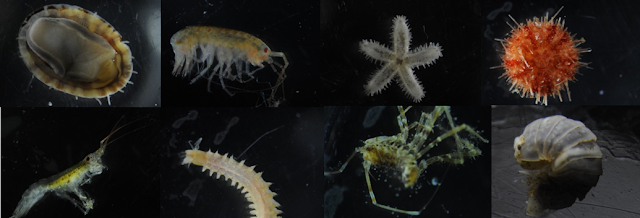The Invertebrate Backstory

As promised- at last a science based blog and I apologies for the delay! I can only say that coming back for a second winter in Rothera has made me feel even more disconnected from the 'real' world. As touched on in a previous post , I am continuing to pursue a research goal centered around understanding the role of marine plants in Antarctic ecosystems. Globally marine plants play an incredibly important role in aquatic ecosystems such as supporting food webs and providing shelter for an array of organisms. When marine plants erode and senesce, some of their carbon is transferred through the ecosystem in the form of detritus. The rest of the plant material remains in situ where the carbon is remineralised (broken down) by invertebrate grazers and bacteria. Plant material can be exported from shallow, coastal habitats into deeper sediments (known as carbon sinks) where it is buried. This process if known as carbon sequestration. Our dive team has been sampling accumulations
